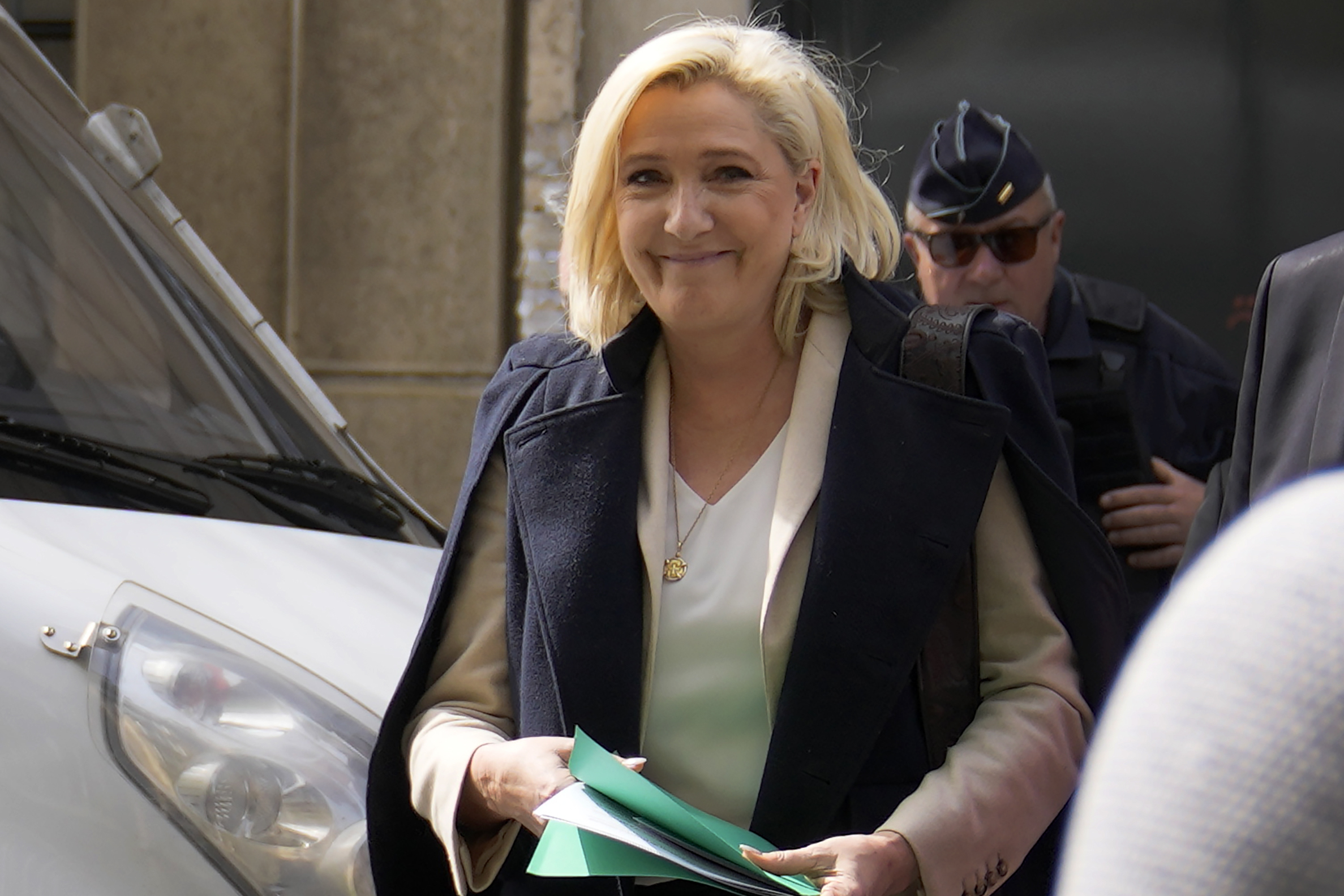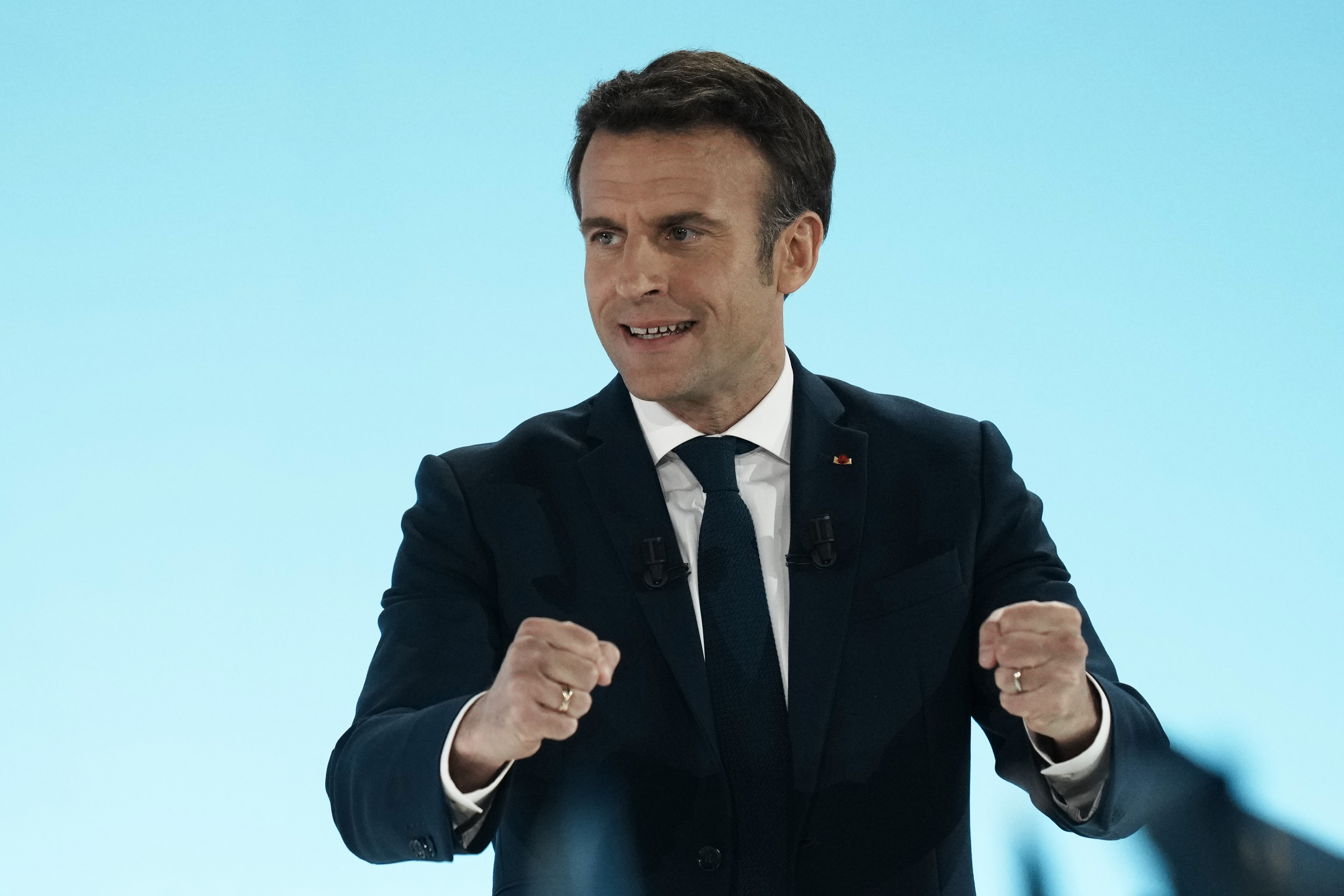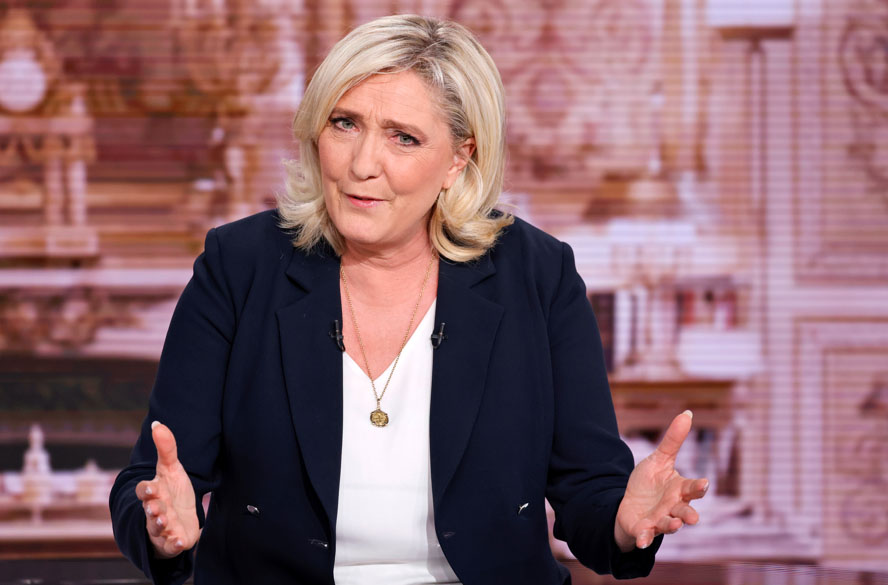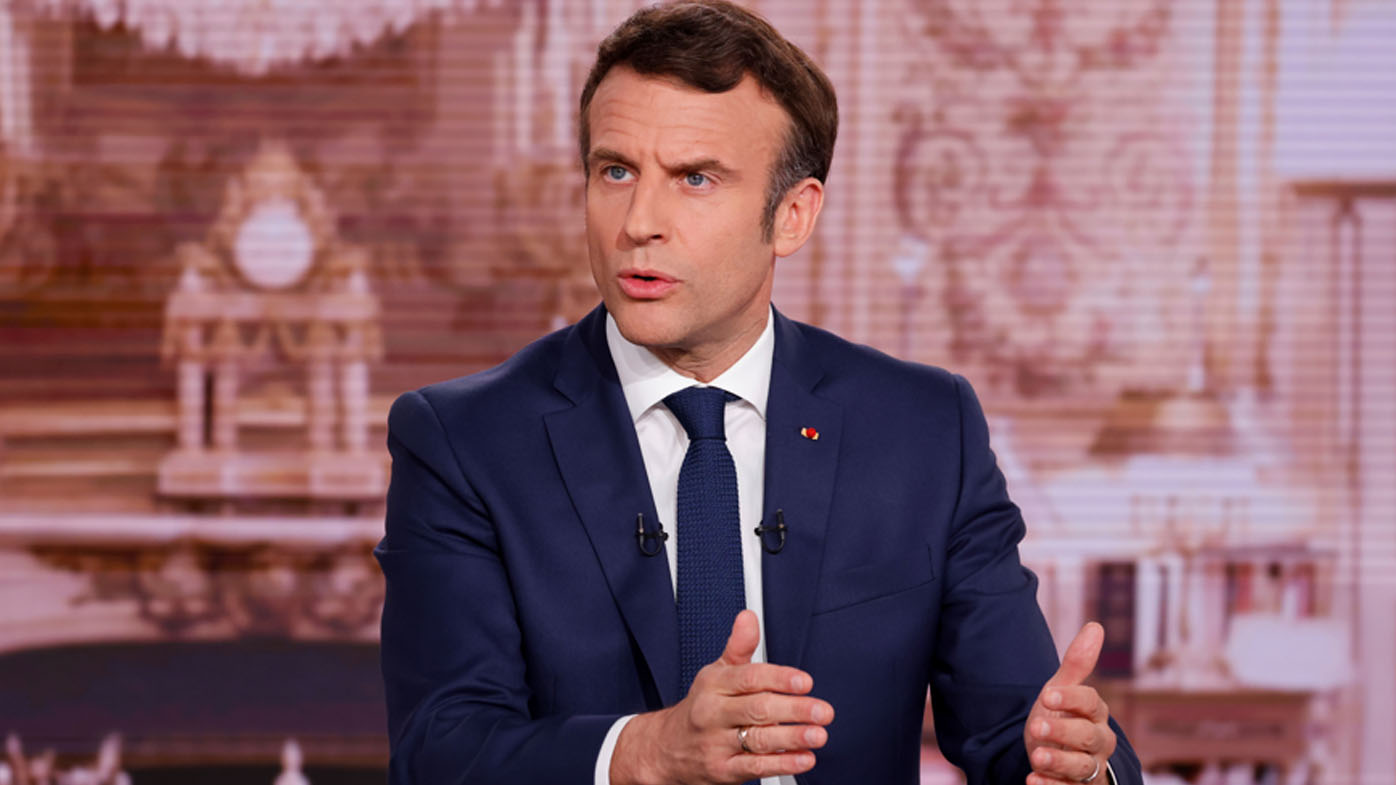The thought of an extreme-right leader standing at the helm of the European Union would be abhorrent to most in the 27-nation bloc.
But if Emmanuel Macron falters in the April 24 French presidential elections, it might be two weeks away.
Experts say a win for far-right candidate Marine Le Pen would have immense repercussions on the functioning of the EU.
READ MORE: Five people shot, unexploded devices found at NYC train station

Not only would her coming to power damage the democratic values and commercial rules of the 27-nation bloc, but it would also threaten the EU's common front and sanctions that have been built in response to Russia's war in Ukraine.
Mr Macron, the incumbent president with strong pro-European views, and Ms Le Pen, an anti-immigration nationalist, couldn't have more radically opposed visions of the EU.
Mr Macron headed on Tuesday to Strasbourg, the seat of the EU parliament, to speak about France's role in Europe. All polls show he is the favourite in the vote, but Ms Le Pen has significantly narrowed the gap compared with the last presidential election five years ago.
France has always stood at the heart of the EU — a founding member that has partnered with neighbour and historical rival Germany to turn the bloc into an economic giant and an icon of Western values.
To hand that vaunted perch to a far-right politician would be bad enough. But, as coincidence would have it, France also holds the EU's rotating six-month presidency this spring, which also allows it to speak with the power of the 27.
It is a pedestal few want to offer to Ms Le Pen. The National Rally leader wants to establish national border controls on imports and people, reduce the French contribution to the EU budget and cease to recognise that European law has primacy over national law.
READ MORE: Putin vows Russia will press Ukraine invasion till goals met

She has proposed to remove taxes on hundreds of essential goods and wants to reduce taxes on fuel — which would go against the EU's free market rules.
Although Ms Le Pen has excised Frexit from her platform, her hostility toward the EU is still clear. "A large majority of French people no longer want the European Union as it exists today," Ms Le Pen told France Inter radio on Tuesday.
She accused the bloc of acting "in an absolutely anti-democratic way, moving ahead with threats and blackmail".
She refuted critics' charges that her policies would amount to a French exit from the EU in disguise. Instead, she said the EU can be changed "from within".
Oppositely, Mr Macron told reporters during a stop in the eastern city of Mulhouse that he "believes in Europe", praising EU action that "changed the lives of our fellow citizens" such as the collective purchase of vaccines amid the COVID-19 pandemic.
He accused Ms Le Pen of speaking "nonsense".
"She explains that she won't pay the bill for the (EU) club, that she will change the rules, but will change the rules alone," Mr Macron said.
"It means she wants to get out (of the EU) but doesn't dare say it anymore."
Jean-Claude Piris, who served as a legal counsel to the European Council and is an expert of EU institutions, said a victory for Ms Le Pen would have the effect of an "earthquake".
READ MORE: Pfizer makes huge offer to buy Aussie app

"She is in favour of a form of economic patriotism with state aids, which is contrary to the rules of the single market," Mr Piris said in an interview with The Associated Press.
"France would no longer take part in the common free market and commercial policies."
"She wants to modify the French constitution by giving preference to the French, by suppressing the right of the soil, the right of asylum", which would be "totally incompatible with the values of the European treaties", he added.
Mr Piris said the arrival of Ms Le Pen would also threaten the unanimity of the 27 on the sanctions they have adopted so far against Russia over its invasion of Ukraine. She could prevent further measures being adopted. The bloc is currently mulling the opportunity to add further restrictions on oil imports from Russia.
Ms Le Pen has built close links with the Kremlin over the years. In her previous bid to become the French president in 2017, she called for strong security ties with Moscow to jointly combat radical Islamic groups.
She also pledged to recognise Crimea — the peninsula annexed from Ukraine in 2014 — as part of Russia.
Ms Le Pen acknowledged Russia's invasion of Ukraine has "partially" changed her views about Russian President Vladimir Putin, saying he was "wrong" and expressing her support toward the Ukrainian people and refugees.
READ MORE: Russia accused of new 'absolute violation' in Ukraine

Mr Piris believes although Ms Le Pen could find allies in a couple of right-wing governments currently in power in eastern Europe, she would be facing hostile reactions from most other EU members.
A report from the Centre for European Reform published on Monday highlighted how Ms Le Pen could very well go down the same road as Hungarian Prime Minister Viktor Orban and his Polish counterpart Mateusz Morawiecki in throwing up roadblocks for Brussels wherever she can to further slow the EU's already cumbersome decision-making.
"The difference is that France ... is indispensable to the EU", the report stressed, saying the consequences would be "political chaos".
CER experts also believe Ms Le Pen's policies would clash with the bloc's climate goals.
Ms Le Pen is in favour of expanding nuclear energy and several non-governmental groups have warned she would slow down the transition toward renewables.
On top of that, the traditional French-German tandem would be undermined, with German Socialist chancellor Olaf Scholz highly unlikely to reach any compromise with Ms Le Pen.
Neighbouring Luxembourg's long-serving Foreign Minister, Jean Asselborn, called the situation "very, very worrying".
Ms Le Pen as French president "would be not just an upheaval in Europe as a project of values, a peace project; it would put us on a totally different track in the essence of the European Union," he said.
"The French must prevent that."
from 9News https://ift.tt/x6bdpwS
April 12, 2022 at 10:51PM
https://ift.tt/8doyWJr
The thought of an extreme-right leader standing at the helm of the European Union would be abhorrent to most in the 27-nation bloc.
But if Emmanuel Macron falters in the April 24 French presidential elections, it might be two weeks away.
Experts say a win for far-right candidate Marine Le Pen would have immense repercussions on the functioning of the EU.
READ MORE: Five people shot, unexploded devices found at NYC train station

Not only would her coming to power damage the democratic values and commercial rules of the 27-nation bloc, but it would also threaten the EU's common front and sanctions that have been built in response to Russia's war in Ukraine.
Mr Macron, the incumbent president with strong pro-European views, and Ms Le Pen, an anti-immigration nationalist, couldn't have more radically opposed visions of the EU.
Mr Macron headed on Tuesday to Strasbourg, the seat of the EU parliament, to speak about France's role in Europe. All polls show he is the favourite in the vote, but Ms Le Pen has significantly narrowed the gap compared with the last presidential election five years ago.
France has always stood at the heart of the EU — a founding member that has partnered with neighbour and historical rival Germany to turn the bloc into an economic giant and an icon of Western values.
To hand that vaunted perch to a far-right politician would be bad enough. But, as coincidence would have it, France also holds the EU's rotating six-month presidency this spring, which also allows it to speak with the power of the 27.
It is a pedestal few want to offer to Ms Le Pen. The National Rally leader wants to establish national border controls on imports and people, reduce the French contribution to the EU budget and cease to recognise that European law has primacy over national law.
READ MORE: Putin vows Russia will press Ukraine invasion till goals met

She has proposed to remove taxes on hundreds of essential goods and wants to reduce taxes on fuel — which would go against the EU's free market rules.
Although Ms Le Pen has excised Frexit from her platform, her hostility toward the EU is still clear. "A large majority of French people no longer want the European Union as it exists today," Ms Le Pen told France Inter radio on Tuesday.
She accused the bloc of acting "in an absolutely anti-democratic way, moving ahead with threats and blackmail".
She refuted critics' charges that her policies would amount to a French exit from the EU in disguise. Instead, she said the EU can be changed "from within".
Oppositely, Mr Macron told reporters during a stop in the eastern city of Mulhouse that he "believes in Europe", praising EU action that "changed the lives of our fellow citizens" such as the collective purchase of vaccines amid the COVID-19 pandemic.
He accused Ms Le Pen of speaking "nonsense".
"She explains that she won't pay the bill for the (EU) club, that she will change the rules, but will change the rules alone," Mr Macron said.
"It means she wants to get out (of the EU) but doesn't dare say it anymore."
Jean-Claude Piris, who served as a legal counsel to the European Council and is an expert of EU institutions, said a victory for Ms Le Pen would have the effect of an "earthquake".
READ MORE: Pfizer makes huge offer to buy Aussie app

"She is in favour of a form of economic patriotism with state aids, which is contrary to the rules of the single market," Mr Piris said in an interview with The Associated Press.
"France would no longer take part in the common free market and commercial policies."
"She wants to modify the French constitution by giving preference to the French, by suppressing the right of the soil, the right of asylum", which would be "totally incompatible with the values of the European treaties", he added.
Mr Piris said the arrival of Ms Le Pen would also threaten the unanimity of the 27 on the sanctions they have adopted so far against Russia over its invasion of Ukraine. She could prevent further measures being adopted. The bloc is currently mulling the opportunity to add further restrictions on oil imports from Russia.
Ms Le Pen has built close links with the Kremlin over the years. In her previous bid to become the French president in 2017, she called for strong security ties with Moscow to jointly combat radical Islamic groups.
She also pledged to recognise Crimea — the peninsula annexed from Ukraine in 2014 — as part of Russia.
Ms Le Pen acknowledged Russia's invasion of Ukraine has "partially" changed her views about Russian President Vladimir Putin, saying he was "wrong" and expressing her support toward the Ukrainian people and refugees.
READ MORE: Russia accused of new 'absolute violation' in Ukraine

Mr Piris believes although Ms Le Pen could find allies in a couple of right-wing governments currently in power in eastern Europe, she would be facing hostile reactions from most other EU members.
A report from the Centre for European Reform published on Monday highlighted how Ms Le Pen could very well go down the same road as Hungarian Prime Minister Viktor Orban and his Polish counterpart Mateusz Morawiecki in throwing up roadblocks for Brussels wherever she can to further slow the EU's already cumbersome decision-making.
"The difference is that France ... is indispensable to the EU", the report stressed, saying the consequences would be "political chaos".
CER experts also believe Ms Le Pen's policies would clash with the bloc's climate goals.
Ms Le Pen is in favour of expanding nuclear energy and several non-governmental groups have warned she would slow down the transition toward renewables.
On top of that, the traditional French-German tandem would be undermined, with German Socialist chancellor Olaf Scholz highly unlikely to reach any compromise with Ms Le Pen.
Neighbouring Luxembourg's long-serving Foreign Minister, Jean Asselborn, called the situation "very, very worrying".
Ms Le Pen as French president "would be not just an upheaval in Europe as a project of values, a peace project; it would put us on a totally different track in the essence of the European Union," he said.
"The French must prevent that."




